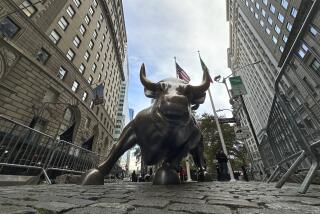Wild Trading Points to Big Shift in Market Tone
NEW YORK — A wild session on Wall Street on Wednesday saw Rust Belt stocks score Internet-like gains, while technology stocks overall tumbled in the heaviest Nasdaq trading ever.
Meanwhile, laggard smaller stocks continued to rebound while many big-name issues tanked.
The split performance left many analysts wondering whether the narrow U.S. market rally of this year is simply broadening out--or whether the latest manic action is signaling a near-term peak.
The Dow industrials closed up 16.65 points at a record 10,411.66, but the blue-chip index had been up as much as 131 points before selling kicked in.
The Dow’s rally was powered by dramatic gains in normally stodgy industrial names such as aluminum giant Alcoa, heavy-machinery maker Caterpillar and International Paper. Traders said some investors appeared to be flocking to those shares in a bet that the global economy’s outlook is improving.
On the flip side, technology leaders such as Intel, Microsoft and many Internet-related names suffered heavy profit-taking, driving the Nasdaq composite index down 76.22 points, or 3%, to 2,507.28.
Nasdaq trading volume soared to a record 1.42 billion shares, eclipsing the previous record of 1.35 billion set Oct. 28, 1997.
Despite the drop in the Nasdaq index--which is dominated by major tech stocks--more Nasdaq stocks rose than fell Wednesday, with winners topping losers by a 22-19 margin.
Likewise, winners led losers by an 18-13 margin on the New York Stock Exchange, where trading also was heavy but not a record.
A Standard & Poor’s index of 600 smaller stocks jumped 1.2% for the day, even as the blue-chip S&P; 500 tumbled 1.6%.
Some analysts said the pronounced divergences in the market--small stocks up, big stocks down; industrial names up, tech stocks down--suggest a major shift away from the relative handful of blue-chip and tech issues that have led Wall Street higher this year.
Richard Cripps, chief investment strategist at Legg Mason, said the market is “in transition to valuation-driven rather than liquidity-driven names”--meaning a shift toward cheaper stocks and away from the brand-name issues whose gains have driven their price-to-earnings ratios to record highs.
The extreme valuations in the tech sector and, obviously, among Internet stocks may finally have driven investors toward cheaper pastures, said Jerry H. Dombcik, research chief at McDonald & Co. Securities in Cleveland.
While America Online dived $8.44 to $150.88 and Intel slid $3.50 to $57, Alcoa leaped $6.56 to $53.25 and Caterpillar surged $5.94 to $60.69.
Conventional wisdom has it that “cyclical” stocks such as Alcoa and Cat post their greatest gains at the start of an economic recovery, not in the middle of a long expansion.
But if a genuine rally has begun in those names, it wouldn’t be the first rule this bull market has broken, experts noted.
Cripps said a rotation toward value stocks could produce explosive price moves. The 50 largest stocks in the S&P; 500 account for 57% of the index’s market capitalization, he said. A shift of just 1% of that value into the bottom 50 stocks would cause their prices to multiply eight times, Cripps said.
The question is whether Wednesday’s rally was simply a short-lived burst of enthusiasm by “momentum” investors, who try to exploit market hot spots for quick gains.
If the gains in industrial stocks and smaller stocks aren’t sustained, while profit-taking continues to hammer former leaders in technology, drugs and financial stocks, the market overall could be set for a sharp pullback, some warned.
Among the brand-name issues down sharply Wednesday were Merck, off $4.63 to $78.50, and Wal-Mart, down $5.94 to $98.63. Both are in the Dow.
Although some industrial sectors--such as the paper industry--are reporting stronger-than-expected first-quarter earnings, many companies in the raw-materials business are still waiting for prices of their commodities and products to recover.
Steelmakers USX U.S. Steel, up $2.50 to $28.94, and Nucor, up $3.50 to $55.81, had a big day Wednesday. Although pricing power in the metals industry has been all but nonexistent for more than a year, manufacturers have been able to make price hikes stick for certain specialty-steel products.
In many cases, industrial firms whose earnings were battered in the second half of 1998 by a plunge in demand from Asia should be able to post large percentage gains later this year with even a modest improvement in Asian demand, analysts said.
Dombcik recounted a recent conversation with an officer of A. Schulman Inc., an Akron, Ohio, maker of industrial plastics. Although he acknowledged that the firm’s Asian markets still haven’t recovered, the executive thought it was unreasonable for his stock to be trading at “liquidation” prices.
McDonald upgraded Schulman to a “buy.” It gained $1.25 to $15.25 on Wednesday.
Market Roundup, C8
More to Read
Inside the business of entertainment
The Wide Shot brings you news, analysis and insights on everything from streaming wars to production — and what it all means for the future.
You may occasionally receive promotional content from the Los Angeles Times.










